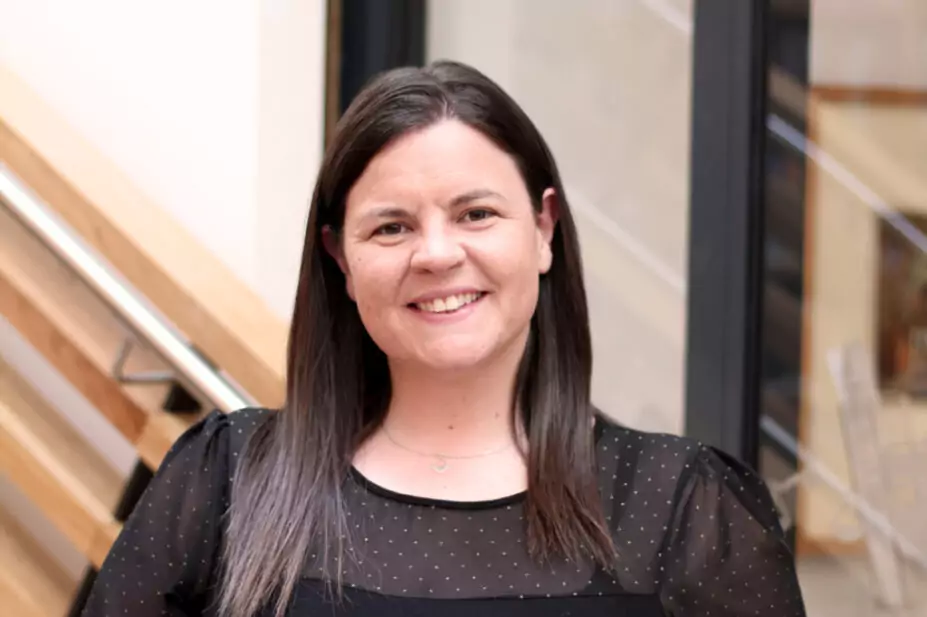
The Pharmaceutical Journal
In 2008, Elen Jones won a competition called the ‘RX factor’, run by the Royal Pharmaceutical Society to find pharmacists able to become the face of the profession in the media — and she certainly has retained all the enthusiasm that she had back then.
Fifteen years later, as director for Wales at the RPS, Jones is working hard to make the country’s ‘vision for pharmacy’, published in 2019, a reality for pharmacists. She says that her motivation for working in policy came from wanting to move from being “reactive to proactive” over the things that pharmacy could provide for patients. And that is exactly what she is doing.
The Pharmaceutical Journal caught up with Jones to find out what she is currently focusing on.
You have a vision for pharmacy with goals for 2025. Could you summarise what that looks like at the moment?
What’s different about the vision in Wales this time is that, although it’s been driven by the RPS, it’s actually owned by the Welsh Pharmaceutical Committee: a statutory advisory body to Welsh government, consisting of a lot of the key pharmacy groups from across Wales.
To make the vision a reality, we have set stepping stones to get there. Because of the COVID-19 pandemic, some things had been achieved at a quicker rate than we were hoping — particularly the technology aspects — and some things needed a bit more focus. That gave us a chance to think about how far we had come over those three years and to set new goals for 2025.
We have remained aligned to the same themes, so the 2025 goals don’t in any way supersede the vision. This is a way to keep everyone on track and make sure that we’re taking account of any changes that are happening. Patient experience is always the one that I think is most important. And then we’re thinking about how the workforce and technology and everything else can wrap around the patient experience.
You are particularly focused on sustainability in pharmacy, could you talk through some highlights of that?
I think this really demonstrates the change in how we’ve been working since the pandemic within RPS. We have a real focus on a Great Britain approach to our work as country teams, but ensuring that the nuances of each country are captured in the way that we’re applying the policies. As country directors, we all lead on different policy areas. I’ve been thrilled to be able to be the director lead on sustainability; it’s really opened my eyes to the impact that healthcare is having on the environment. It’s not just about the carbon footprint of medicines, but the impact of medicines on the environment, on our marine life, all those things. I enjoy being able to pass on the information that I’ve learned to our members, and work with our members — who are way more advanced on this than me — to help pave the way in how we should go forward with it.
One of the best things for me is when our policy work develops into something else; when our recommendations become reality
The pharmacists that work under the banner of ‘Pharmacy Declares’ have been crucial partners for us in developing our work; the passion that they have for driving this forward is absolutely immense. One of the best things for me is when our policy work develops into something else; when our recommendations become reality, but also when we get a chance to add more layers of support.
For me, that’s what this new commission with NHS England to create a toolkit is: creating a framework to help pharmacists and teams think about becoming more green. If we can get all those people to make even one slight change, that can have a massive impact on our efforts to become more environmentally aware and sustainable as a professional organisation, and then for pharmacists across Great Britain.
The use of the common ailments service in community pharmacy increased by 46% during winter 2022/2023. What contributed to this massive jump?
I do think people have turned to community pharmacy a lot over the past few years. They’ve always been a port of call, but I think the messaging about being that first port of call really is hitting home.
We’ve got access to so many more tools and resources that we can share with patients, providing them with a better range of medicines and giving them ongoing support, including for prescribing for ailments that might not be on the common ailments scheme, for those that have got competencies in those areas. Those members that speak to us on a regular basis about what they’re offering are, I think, becoming really inundated. People are coming to them and saying: “I need to see the pharmacist”, “I need this service”. It’s been a real change, and I do think a lot of it stems back to the vision work and the way that Community Pharmacy Wales and the Welsh government have embraced that vision, and ensured that the community pharmacy contract is aligned to those ambitions.
In the 2030 vision, we are aiming for there to be a prescriber in every community pharmacy in Wales. When we have that consistency, the messages become so much easier, because, at the moment, it is hard to say: “In some areas, you can gain these amazing services”. Where it’s consistently available everywhere, those messages are so much easier. And that’s what we’re getting with a common ailment scheme: that consistency across Wales.
The first electronic prescriptions are expected to be sent from GPs to pharmacies in summer or early autumn 2023 in Wales. How big is this for the country?
This is going to be a really big deal. We’re very aware that we’re maybe a little bit further behind other countries in Great Britain on this.
I think that connectivity between practitioners, between community pharmacy, general practice, and ultimately hospitals is going to enable us to do so much more. I think it’ll make care a lot safer, because everything will be updated in real time. It takes pressure off patients having to take information from one place to another physically. We have been calling for this for a long time at RPS; it’s been one of our key policy areas, and we continue to work with other royal colleges, professional bodies and the government to ensure that this happens. We can’t underestimate what a game changer this could be for pharmacy, and patients.
How significant are the Daffodil Standards for pharmacy ?
This is one of the things that I’m really excited about. It’s such an important time for patients and their families, and you only get one chance to get this right. During palliative care and the end of life, patients and carers have got somewhere far more important to be than in front of a pharmacist trying to get their medicines sorted.
A lot of patients shared really positive experiences of having a pharmacist that went over and above to ensure that everything was in place for them
Through the policy development, a lot of patients shared really positive experiences of having a pharmacist that went over and above to ensure that everything was in place for them. But, too often, getting medicines can be a really problematic thing for people with palliative care, particularly when that care is needed in the community.
The project has been a real joint effort between us and Marie Curie. Although it’s come from Wales and the work that we’ve done, it’s for the whole of the UK. We’re not saying everyone will be able to tick every box on this, but we want everyone to start and to work through the steps to ultimately be able to say that they can tick every box, and they can support their patients in the best way possible during that really difficult time.
Is there anything you can share about the review of hospital pharmacy services due to be published in July 2023?
It’s been a challenging programme of work; we’ve had over 1,000 engagements, over 600 people come and speak to us face to face and virtually, and another 200 people come to speak to us just about the prescribing, which Karen Hodson, professor in pharmacy practice at Cardiff University, has led for us. We have also had surveys out there through a fourth year project that we undertook at Cardiff University, which had over 120 responses. We put out a call for good practice in Wales and we had around 150 examples.
Ultimately, we’re releasing the time of clinicians, pharmacists and pharmacy technicians, to be more patient facing. We have got a big list of recommendations: the exact number is still to be confirmed, but over 30 recommendations with actions that we are going to propose to Welsh government, who will then respond. At that point, then we can understand a bit more about how we can help the service to actually deliver the changes that are needed.
Is there anything you would like to talk about, or any particular message that you would like to get out there, while we are here?
I want to ensure the next generation of pharmacists coming through understand what the RPS is about, what professional leadership is about, and how, together, we can make change happen. I think we’re very fortunate within the RPS to have so much expertise. My hope is that we can just instil that passion in the generations that are coming through. I want to spend more time back at the universities over the next few years: a lot of that was halted a little bit by COVID-19. It’s great to see the passion from students: they energise me, and challenge us as well, with some of the questions that they have. So that’s going to be a big priority for me over the next few years — to make sure that we’re giving universities as much support as possible to understand the wider landscape of pharmacy and how the future hopefully will look for them as they become practitioners.
You may also be interested in

Ngozi Kalu: ‘When research lacks representation, findings become biased and inequalities emerge’

Henry Gregg: ‘The only way to slow down pharmacy closures is to start closing that £2.6bn funding gap’
